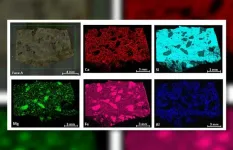CDDEP's report 'The State of the World's Antibiotics' highlights the growing threat of AMR
CDDEP's report on 'The State of the World's Antibiotics in 2021' highlights the growing threat of antimicrobial resistance against a backdrop of increasing antibiotic consumption
2021-02-03
(Press-News.org) Washington, DC / New Delhi, India - Researchers at CDDEP have released, The State of the World's Antibiotics in 2021, which presents extensive data on global antimicrobial use and resistance as well as drivers and correlates of antimicrobial resistance, based on CDDEP's extensive research and data collection through ResistanceMap, a global repository that has been widely used by researchers, policymakers, and the media.
Since the first State of the World's Antibiotics report in 2015, antimicrobial resistance has leveled off in some high-income countries but continues to rise in many low- and middle-income countries (LMICs), where access to antibiotics has risen with increases in gross domestic product per capita. Per capita antibiotic consumption in LMICs is lower than in high-income countries, despite a higher infectious disease burden; however, consumption rates are rapidly converging. These trends reflect both better access to antibiotics for those who need them and increases in inappropriate antibiotic use.
An important driver of resistance is antibiotic use in humans and in terrestrial and aquatic animals raised for human consumption. Global antibiotic consumption in humans increased by 65 percent between 2000 and 2015, whereas consumption in animals is expected to increase by 11.5 percent between 2017 and 2030. If nothing changes to alter these trajectories, antibiotic consumption is likely to increase worldwide by 200 percent between 2015 and 2030.
The approaches to addressing AMR are to reduce the need for antibiotics (through prevention of infections), to reduce the use of antibiotics (by better use of diagnostics and antibiotic stewardship), and to innovate to find new methods of disease prevention and treatment. All three strategies are needed so that a strong arsenal of effective antibiotics can be maintained.
This report introduces country-level dashboards that capture progress on indicators that track AMR and show what remains to be done to decrease the need for antibiotics and their inappropriate use.
"We are optimistic that future generations will also witness the miracle of antibiotics. To ensure that privilege, it is incumbent on us to treat the crown jewels of modern medicine with care and respect," said Dr. Laxminarayan, Director at CDDEP.
The State of the World's Antibiotics in 2021 is published in CDDEP's website and is available for download here: https://cddep.org/blog/posts/the-state-of-the-worlds-antibiotics-report-in-2021/
It is being launched at a global webinar featuring Dame Sally Davies, and Professors Otto Cars, Abdoulaye Djimde, and Ramanan Laxminarayan.
INFORMATION:
About the Center for Disease Dynamics, Economics & Policy Inc.
The Center for Disease Dynamics, Economics & Policy Inc. (CDDEP) produces independent, multidisciplinary research to advance the health and wellbeing of human populations around the world. CDDEP projects are global in scope, spanning Africa, Asia, and North America, and include scientific studies and policy engagement. The CDDEP team is experienced in addressing country-specific and regional issues, as well as global challenges, such as antibiotic resistance and pandemic influenza. CDDEP research is notable for innovative approaches to design and analysis, which are shared widely through publications, presentations, and web-based programs. CDDEP has offices in Washington, D.C., and New Delhi and relies on a distinguished team of scientists, public health experts, and economists.
ELSE PRESS RELEASES FROM THIS DATE:
2021-02-03
Researchers have found new evidence that global warming is affecting the size of commercial fish species, documenting for the first time that juvenile fish are getting bigger, as well as confirming that adult fish are getting smaller as sea temperatures rise. The findings are published in the British Ecological Society's Journal of Applied Ecology.
The researchers from the University of Aberdeen looked at four of the most important commercial fish species in the North Sea and the West of Scotland: cod, haddock, whiting and saithe. They found that juvenile fish in the North Sea and on the West of Scotland have been getting bigger while adult fish have been getting smaller. These changes ...
2021-02-03
The world's largest bird, the ostrich, has problems reproducing when the temperature deviates by 5 degrees or more from the ideal temperature of 20 °C. The research, from Lund University in Sweden, is published in Nature Communications.
The results show that the females lay up to 40 percent fewer eggs if the temperature has fluctuated in the days before laying eggs. Both male and female production of gametes is also negatively affected.
"Many believe that ostriches can reproduce anywhere, but they are actually very sensitive to changes in temperature. Climate change means that temperatures will fluctuate even more, and that could be a challenge for the ostrich", says Mads Schou, researcher at Lund ...
2021-02-03
Mothers are at increased risk of mental health problems as they struggle to balance the demands of childcare and remote working in COVID-19 lockdowns, according to new research from an international team of researchers.
The findings, published in the journal Psychological Medicine, were drawn from a comprehensive, online survey of mothers in China, Italy and the Netherlands.
Changes to their working lives, family strife and loss of social networks emerged as common factors affecting the mental health of mothers in all three countries.
The study was carried out by a team from Radboud University, ...
2021-02-03
Scientists from MIPT, Moscow Pedagogical State University and the University of Manchester have created a highly sensitive terahertz detector based on the effect of quantum-mechanical tunneling in graphene. The sensitivity of the device is already superior to commercially available analogs based on semiconductors and superconductors, which opens up prospects for applications of the graphene detector in wireless communications, security systems, radio astronomy, and medical diagnostics. The research results are published in a high-rank journal Nature Communications.
Information transfer in wireless networks is based on transformation of a high-frequency continuous electromagnetic wave into a discrete sequence of bits. This technique is known as signal modulation. ...
2021-02-03
People receiving treatment for cancer are known to feel better with physical training. But does it make any difference how vigorously they exercise? A new study by researchers at Uppsala University shows that whether the training is intensive or rather less strenuous, its effect is roughly the same. The results are published in the journal Scandinavian Journal of Medicine and Science in Sports.
Physical activity and training during cancer therapy improve physical and mental health, and may also reduce the most common side effects of the treatment. This has been confirmed in several international studies. Many patients suffer from cancer-related fatigue, and both resistance and endurance training are known to lessen fatigue. ...
2021-02-03
The IBeA research group from the University of the Basque Country's Department of Analytical Chemistry, Faculty of Science and Technology, is participating in NASA's Mars2020 space mission, which is scheduled to touch down on Mars in February this year. Specifically, the group has participated in constructing and verifying the chemical homogeneity of the templates included on the calibration card of the SuperCam instrument mounted on the Perseverance. 'We made a set of pads perfectly characterised in accordance the instruments we have here, in order to enable us to verify that the LIBS and Raman spectroscopy measurements taken by the SuperCam are correct,' explains Doctor Cristina García-Florentino. 'Raman spectroscopy is a technique ...
2021-02-03
The COVID-19 pandemic has had a profound effect on higher education -- shifting classes online, canceling events, and putting financial strain on institutions.
One area of academia that has actually shown positive increases, however, is the submission of research papers. A study conducted by Michelle Bell, Mary E. Pinchot Professor of Environmental Health at the Yale School of the Environment (YSE), and postdoctoral associate Kelvin C. Fong found the rate of manuscript submission to a major peer-reviewed journal (American Journal of Public Health) were higher during the pandemic -- but also revealed ...
2021-02-03
In the wake of repeated school shootings across the United States, today's youth have been called the mass shooting generation. A new study examined public support for arming school employees. The study found consensus for arming school resource officers, but division over whether to arm teachers and nonteaching staff. The research has clear implications for policy, including the possibility that support for arming school staff may diminish over time as young people (who are less supportive) make up a larger share of voters.
The study was conducted ...
2021-02-03
The properties of human mind affect the quality of scientific knowledge through the insertion of unconscious cognitive biases. Scientists from the University of Turku, Finland, have found that the current level of awareness about research biases is generally low among ecology scientists. Underestimation of the risks associated with unconscious cognitive biases prevents avoiding these risks in a scientist's own research. Due to unconscious origin of biases, it is impossible to combat them without external intervention.
When scientists use some device in their research, they always account for characteristics of this device, such as accuracy and precision. The human mind is the ...
2021-02-03
The findings of a new study examining the behaviours of alligator and caiman hatchlings have enhanced our understanding of how we can conserve, and increase, the population of endangered crocodilian species.
At adult size, there are key differences between the American alligator and the closely related spectacled caiman. However, at the time of hatching both species are tiny and might be expected to show similar behaviours in order to avoid being eaten by almost any carnivore around.
Now, researchers at the Universities of Lincoln and Vienna have conducted comparative studies between the hatchlings of these crocodilian creatures and found that the alligators are more active and likely to explore their surroundings.
The research, conducted at 'Crocodiles of the World', the only zoo ...
LAST 30 PRESS RELEASES:
[Press-News.org] CDDEP's report 'The State of the World's Antibiotics' highlights the growing threat of AMR
CDDEP's report on 'The State of the World's Antibiotics in 2021' highlights the growing threat of antimicrobial resistance against a backdrop of increasing antibiotic consumption


